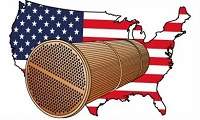Contaminants Reduce Efficiency
Heat Exchanger fouling and maintenance contribute to long-term reliability and overall cost reduction. Whether new or old, heat transfer systems that utilize water or coolant fluids will accumulate mineral scales and/or oily contamination during construction or operation. These scales and contaminants can drastically reduce the heat transfer efficiency of the heat exchangers due to low thermal conductivity of scales and oil sludge build up, which reduce the heat transfer and surface area contact.
Even the slightest buildup of rust or other scales can cause a dramatic reduction in heat transfer efficiency. "For example, a one-inch thick piece of steel coated with just 1/16 inch of rust has the same heat transfer characteristics as a four-inch thick piece of steel." Dow Labs.
Thermal Conductivity At Risk
In fact, the thermal conductivity of the scale is in the same range as insulation materials such as firebrick. To make sure the performance of the Heat Exchangers meets design specifications, the fouling must be removed. Heat transfer is heat energy in motion. How fast the heat transfers is called the rate of heat transfer. The method by which that heat transfers in the case of Lube Oil Coolers is conductivity. Thermal conductivity in the case of the Lube Oil Coolers is affected by a buildup of material on both sides of the tube wall.
In the IDs of the tubes there will be the normal buildup of mud, Calcium and Iron. Usually they can be removed via conventional methods of cleaning; scrapers, brushes, high pressure water jetting, or chemical cleaning.
Shell Side Cleaning Is Essential
The shell side will build up with varnish, lacquer, algae, oil sludge, and foreign particles. NHE can refurbish your bundles as close to new as possible- reaching 98% of your original Heat Transfer using our Patented Processes. Cleaning results in better control of your oil viscosity by being capable of controlling your oil temperature. In the case of your seal oil system, it will help maintain pressure differentiation between the seal oil and the generator Hydrogen Pressure.
By increasing the ability of the system, we maintain the Seal Oil PSI higher than any given generator Hydrogen Pressure. Clean Lube Oil Coolers are the key components in keeping your turbine in perfect operating order. You will lose 15%-30% of your heat transfer from varnish or lacquer build up on the shell side of your oil coolers.

